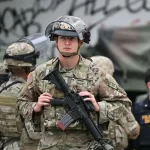With the world dealing with war, financial problems, and shaky politics, the UK is increasing its pressure on Russia with new sanctions. Announced on September 12, 2025, these sanctions hit about 100 Russian groups connected to oil money, military supply lines, and secret shipping activities. Many people see this as more than just another move in the West’s face-off with Moscow. It shows that London plans to use all its financial and diplomatic power to cut off the funds that support Russia’s war efforts.
These sanctions arrive as the conflict in Ukraine continues without a clear end. Russia, despite suffering big losses and money problems, has continued its military plans. It depends on oil sales, hidden trade networks, and a tough government to keep going. The UK’s new actions try to directly attack these money sources, hoping to reduce Russia’s ability to keep fighting the war.
The latest restrictions are extensive. They include penalties for companies directly providing Russia’s military with key equipment and shipping companies in the shadow fleet that moves Russian oil, going against international limits.
By blocking their access to insurers, financiers, and service providers in the UK, the government aims to disrupt these hidden operations. Also, several banks, logistics companies, and industrial suppliers tied to Moscow’s defense industry have been blacklisted. Their assets in the UK will be frozen, and British people or businesses can’t deal with them. Yet, as more companies face restrictions, Russia’s struggling economy will likely worsen.
These sanctions are as much about politics as they are about money. With this big package, the UK is standing with Ukraine and the West against Moscow. Yvette Cooper, the Foreign Secretary, said the goal is to cut off the money that fuels Russia’s attacks. She said that every pound, dollar, or euro that Russia doesn’t get will make it harder for them to fight and commit crimes in Ukraine. Her words show that these sanctions are more than just punishment; they’re a moral stand. They show that economic warfare is one of the few strong options when we can’t directly fight Russia. The UK seems to be planning for the future. It’s increasing pressure, hoping to reduce Moscow’s resources and push them to talk, or at least make it harder for them to keep attacking.
But some people aren’t so sure. Some British politicians worry about what might happen if the sanctions go on forever. They say that if there’s no clear plan for peace, the sanctions could end up hurting global trade, making inflation worse, and damaging relationships with other countries. Some experts say that if sanctions aren’t the same everywhere, Russia might just get closer to China and other countries that support it. As one expert put it, Sanctions without everyone on board are sanctions that won’t work.
What happens next relies on a few things we can’t predict: how well Russia can change, how strong Ukraine is, and if the West can stick together. The UK needs to make sure its actions overseas don’t hurt its own economy. One thing’s for sure: with each new sanction, Britain shows it’s ready to stand up for international law and democratic values. The UK’s recent sanctions on Russia go beyond oil, banks, or shadow fleets. They’re fighting for a world where attacks are resisted, where breaking the rules has consequences, and where money is used for what’s right, not just for profit.
For Russians, they are a tightening noose. For the UK and its allies, they are a reminder that the battle for freedom in Europe is not fought only with weapons on the battlefield but also with laws, banks, and the relentless will to hold aggressors accountable









